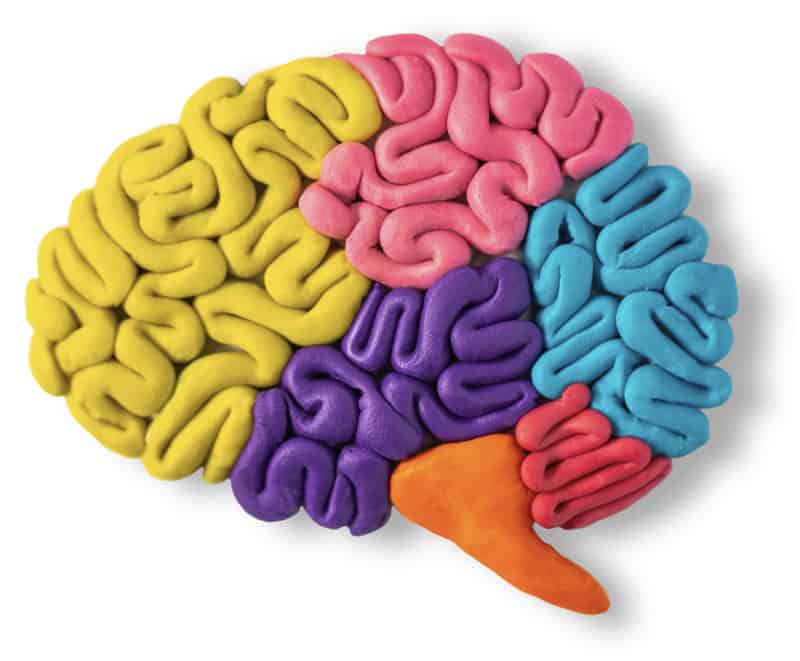
Diabetes brain fog is a real phenomenon that happens to people with diabetes, but there are ways to manage it and prevent it from happening!
Both high and low blood sugars can impact the brain in the short term, and prolonged exposure to these out of range blood sugar levels can lead to diabetes brain fog. So, what can we do to prevent this and manage it?
Diabetes and the brain
Elevated blood sugars can cause damage to blood vessels throughout the body, including the small blood vessels in your brain. So, people with both type 1 diabetes and type 2 diabetes are at risk of the blood vessels in their brain being damaged over time.
Long term risk: diabetes-related dementia
This blood vessel damage results from prolonged elevated blood sugars over time and can lead to cognitive impairment, inflammation, and dementia.
Short term risk: diabetes brain fog
In the moment, when you’re experiencing a low blood sugar or high blood sugar, fuzzy thinking or “brain fog” is an almost immediate symptom. This can resolve for many people though when blood sugars are brought back into normal range, or shortly after.

Cognitive effects of diabetes
The longer you have diabetes, the more at risk you are of developing diabetes-related dementia. But, the good news is, you can reduce your risk of diabetes related dementia by managing your blood sugars. “Diabetes brain fog” can develop over the long term or be related to immediate rises and falls in blood sugar levels.
High and low blood glucose and the brain
What happens in the brain in the moment when we have a low blood sugar or a high blood sugar? We either have too much sugar in the blood stream which can lead to inflammation, or not enough which can lead to confusion and our brain cells not being able to function properly.
Short term symptoms of low blood sugar
Most of the symptoms of mild to moderate low blood sugar involve brain-related symptoms. Confusion, not being able to concentrate, headaches, and irritability are hallmark symptoms of low blood sugar.
Short term symptoms of high blood sugar
Brain-related short term effects of high blood sugar include headaches and mental fatigue.
Diabetes and brain fog
So, by now you can see how both short term blood sugar management and long term blood sugar management can contribute to this feeling of diabetes brain fog.
Nicole Fennell, MS, RDN, LD, CLT, is a renowned expert on combatting brain fog through nutrition. She says, “Blood sugar dysregulation is one of the biggest and most common contributors to brain fog. The brain runs primarily off of glucose, so large fluctuations in blood glucose can hinder optimal brain function– leading to poor concentration, memory, and motivation. Blood sugar dysregulation can also be highly inflammatory. Systemic inflammation can cause decreased neurological function and lead to brain fog.”
Is one of the most common diabetes symptoms brain fog?
It can seem like diabetes and a foggy brain come hand-in-hand, but they don’t have to. What else can someone with diabetes do besides managing blood sugar levels to prevent brain fog?
Nicole advises, “Eating balanced meals high in nutrient dense foods at consistent intervals is crucial for blood sugar balance and thus preventing brain fog. Inconsistent and imbalanced meals can lead to low blood sugar and subsequent increased stress hormones which causes brain fog.”
“Metabolic function, including brain function, is dependent on nutrients we get from food. Nutrient deficiencies that commonly contribute to brain fog include: Vitamin D, magnesium, B-Vitamins (including B12), zinc, copper, and omega-3 fatty acids. Hormonal fluctuations, both sex hormones and stress hormones, can contribute to brain fog. Brain fog can increase during acute and chronic stress, menstrual cycle, pregnancy, postpartum, and menopause.”
Diabetes brain fog FAQs
Some of the most commonly asked questions about diabetes and concentration, often have to do with brain fog or confusion.
Can diabetes cause mental confusion?
Diabetes confusion is a bit of a misleading term because the confusion results more from high or low blood sugars than simply having diabetes itself.
Can diabetes affect your thinking?
Yes, diabetes can directly impact the way your brain functions, and thus your thinking. This can happen temporarily with low and high blood sugars, or more permanently over time if blood sugars are not well managed.
Can high blood sugar cause brain fog?
By now, I have a feeling you know the answer to this one. High blood sugars, both temporarily and over time, can lead to foggy thinking, confusion, chronic headaches and more.
Is diabetes dizziness a thing?
Yes, both low blood sugar and high blood sugar can cause dizziness for some people.
How can you get rid of diabetes brain fog?
Nicole, founder of Brain Fog Boot Camp advises, “The first step is to identify the biggest triggers for diet and lifestyle contributors to your brain fog including: large swings in your blood sugar, stress, nutrient deficiencies, poor sleep, hormonal imbalances, inflammation, gut dysfunction, and dehydration.”
More resources to manage brain fog…
- Tips for managing blood sugars
- Stress and Diabetes: The Impact on Glucose Levels
- Blood Sugar Balance: Choosing the Right Foods







One Response
Headache and depression